Author: Dr. Heather E. Hudson
Professor Emerita, University of San Francisco
Affiliate Professor and Former Director, Institute of Social and Economic Research University of Alaska Anchorage
Introduction
The Internet Society commissioned this report to provide an overview of findings to date on the impacts of the Internet in Indigenous[1] communities in Canada and the United States. It begins by summarizing the theory of the role of information, and by extension, information services such as the Internet in the development process, followed by a review and analysis of the available research on the effects of information services for:
- Personal use
- Health care and education
- Business and commercial activities
- Non-profit organizations and local/tribal governments.
This report then examines how online and mobile software and games are being developed to preserve and promote Indigenous languages and to share knowledge of Indigenous cultures, and how Indigenous enterprises and organizations are operating communications networks and providing digital services, concluding with evaluation planning, research design and indicators that could be included in future evaluations of the impact of the Internet in Indigenous communities.
While focused on the Internet, the research review includes relevant studies of the impact of information technologies in general, and connectivity, particularly broadband, which is required for many Internet applications. The examples are drawn primarily from Alaska and northern Canada, but include references to experiences in other regions of North America and in Hawai’i. The research review was augmented with a workshop at the 2019 Indigenous Connectivity Summit[2] to identify, from a community perspective, indicators that could be used to assess the impact of the Internet in Indigenous communities.
Endnotes
[1] In this report, the term Indigenous is used to refer to American Indian, Native Hawaiian, First Nations, Alaska Native, Métis, and Inuit. When referencing other reports, the term in the original report is used (such as Aboriginal).
[2] See https://www.internetsociety.org/events/indigenous-connectivity-summit/
